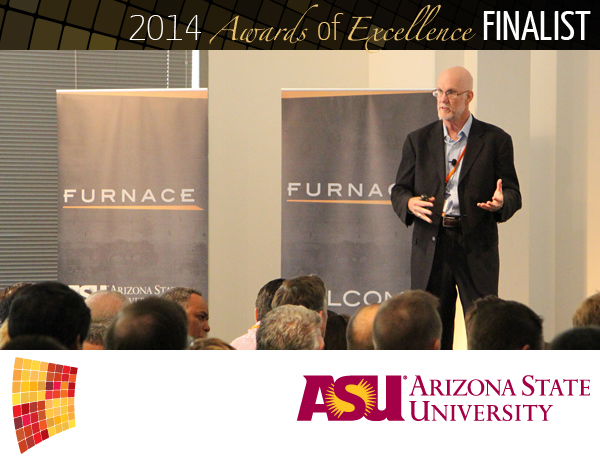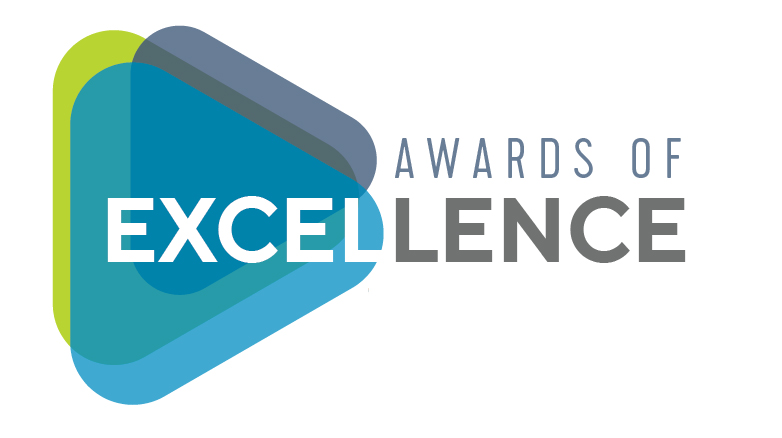Network

| Award Category: | Innovation and Entrepreneurship |
| Project Site: | Furnace Technology Transfer Accelerator |
| Submitted By: | Arizona State University |
| Contact: | Kevin Kovaleski , 480.727.4089 |
Case Study
Abstract
The Furnace Technology Transfer Accelerator, developed by Arizona State University (ASU), is an innovative startup accelerator designed to form, incubate and launch new companies. It is the world’s first technology transfer accelerator, aimed to help the commercialization challenge for research institutions.
Teams compete for the opportunity to license and commercialize technologies, and selected teams participate in an intensive, nine-month accelerator experience that provides seed funding, office space, and access to top industry mentors. Furnace gives entrepreneurs the opportunity to partner with researchers to form high-potential startup companies. Potential participants must go through a competitive application process in which they select a technology available for license, form a team and create a business proposal for a new company. Companies can be formed around one or more technologies from a single research institution or from several institutions. The hundreds of discoveries available for license include medical devices, diagnostic tools, education technology, advanced materials and security devices, among others.
The Furnace methodology is designed to be a flexible system to drive technology transfer. The objective is to actively ‘push’ intellectual property out of research institutions and into the marketplace. It can be set-up to create new startups or it could be used to licensing to large, medium or small existing companies.
Problem/Background
Technology transfer at research institution has several challenges. All research institutions have the same issue: majority of their patents are never used (95%). Yet these patents were created via a huge investment in research spending and are coupled with the cost of the patenting process. Furthermore, Technology Transfer Offices tend to be small and they concentrate on licensing to large companies. There is a lack of engagement with internal and external entrepreneurs. Their offices generally don’t have the means or ability to successfully ‘mass market’ to different groups e.g. corporates, small business, and entrepreneurs.
The Furnace method first began by offering the unencumbered patents owned by ASU to small start-up companies, but rapidly grew to include the patent portfolios of all three of Arizona’s major research universities and other premier research institutions. Partnership intermediaries play a role in the Furnace method, including state economic development entities as well as other research organizations. The ecosystem grew to represent an expanding network of stakeholders, mentors, venture supporters, and others who guide and facilitate the success of these technology transfer and commercialization efforts. Partners included University of Arizona, Northern Arizona University, Dignity Health, Mayo Clinic, Thunderbird School of Global Management, Arizona Commerce Authority, and BioAccel. Furnace has run one successful round within Arizona and currently working with the second cohort of companies.
Furthermore, due to the success of the Furnace program, ASU was awarded a $1 million grant from the U.S. Department of Defense to create a new Pracademic Center of Excellence in Technology Transfer to leverage ASU’s proven method and record of success to support technology transfer and commercialization from Department of Defense laboratories. ASU has experimented to develop, implement and operate a novel approach to technology transfer and commercialization that has proven to be remarkably effective. This approach has demonstrated enormous success in achieving entrepreneurially driven transfer and commercialization of technologies. As a result of this award, ASU will be working with three laboratories, currently including Air Force Research Laboratory in Rome, New York and Space and Naval Warfare Systems Center Pacific in San Diego, California.
Solution
Furnace takes these unused patents and actively “pushes” intellectual property out of the research institutions and into the marketplace where they can be licensed to existing companies or create new startups. The methodology in selection of technologies, translation, and marketing is key to the success in Furnace. It provides a vehicle unlike anything out there to help the technology transfer challenge as well as drive economic growth through job creation.
Results
In Arizona, Furnace has created 15 startups. During the two rounds, more than 200 technologies were selected and translated for commercial applications for the competitions. More than 70 applications were submitted. In the first cohort of startups, a total of more than $1.6M funding was raised by the 10 startups. They created 20 direct and indirect jobs to date.
Future Considerations
With the proven track record and methodology of Furnace, it can work in university environments as well as commercial situations. Through the success and national attention, ASU has been approached by number of interested parties to apply the model to their region. The knowledge is in the “know-how,” which allows Furnace to be easily scaled to other locations and the process and technical infrastructure allows it be replicated simply. Furnace has run in two rounds in Arizona and has expanded to New York and San Diego and is in the process of expanding to Boston. ASU received a grant from the Department of Defense to create a tech transfer center and work with labs to license their technologies that are not being used.
The sustainability of this initiative can continue as long as the interest remains with partners. Partnerships with the research institutions, universities, economic development organizations, funding partners, and entrepreneurial organizations are key to making Furnace be as successful as it can be and to continue over time. At the present, the large interest in Furnace and constant demand to increase commercialization drives the Furnace’s growth. It provides a vehicle unlike anything out there to help the technology transfer challenge as well as drive economic growth through job creation.
Finalist Presentation
UEDA Awards of Excellence Finalists presented at the Annual Summit in Santa Fe on September 29-30, 2014. Summit attendees then voted for the best initiative in each category.

